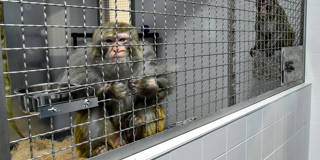There are long-established guidelines proscribing the publication of articles based on scientific experiments or trials that fail to protect the rights of human research subjects. But, as an article published by a leading journal last year chillingly suggests, research based on the torture of non-human subjects is still acceptable.
PRINCETON – In August, Springer Nature, the publisher of 3,000 academic journals, including the Nature portfolio of the world’s most influential science journals, announced new ethics guidance for its editors, addressing the balance between academic freedom and the risk that publication of some research will harm specific groups of humans. The guidance also mentions, though much more briefly, research using animals.
There are long-established guidelines proscribing the publication of articles based on experiments or trials that fail to protect the rights of human research subjects. The new guidance goes beyond this, implying that editors should reject research that contributes to knowledge, and properly protects its research subjects, if, for example, it indirectly contributes to the stigmatization of a vulnerable human group.
The updated ethics guidance therefore adds a new and complex set of considerations to the already difficult decisions that the editors of scientific journals must make. The guidance leaves ample scope for varying interpretations, either more favorable to academic freedom, or more protective of the rights and dignity of members of specific groups of humans. It remains to be seen whether the guidance will narrow the range of topics – and if so, to what extent – on which scientists can hope to be published in a leading scientific journal.

PRINCETON – In August, Springer Nature, the publisher of 3,000 academic journals, including the Nature portfolio of the world’s most influential science journals, announced new ethics guidance for its editors, addressing the balance between academic freedom and the risk that publication of some research will harm specific groups of humans. The guidance also mentions, though much more briefly, research using animals.
There are long-established guidelines proscribing the publication of articles based on experiments or trials that fail to protect the rights of human research subjects. The new guidance goes beyond this, implying that editors should reject research that contributes to knowledge, and properly protects its research subjects, if, for example, it indirectly contributes to the stigmatization of a vulnerable human group.
The updated ethics guidance therefore adds a new and complex set of considerations to the already difficult decisions that the editors of scientific journals must make. The guidance leaves ample scope for varying interpretations, either more favorable to academic freedom, or more protective of the rights and dignity of members of specific groups of humans. It remains to be seen whether the guidance will narrow the range of topics – and if so, to what extent – on which scientists can hope to be published in a leading scientific journal.